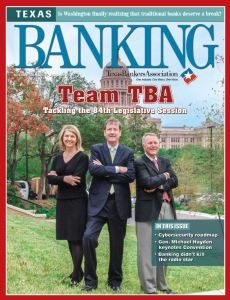Unless you work (or previously worked) in banking, you may not subscribe to the myriad of bank-related industry publications. If you did, you’d know that these magazines usually contain riveting articles about “How the Dodd-Frank Act Impacts Banking” or “Tips for Staying on Top of the Latest Regulatory Changes.” Well, maybe “riveting” is a little generous given the subject matter, but they are helpful—to banks, that is.
 This month, though, there’s an article in Texas Banking Magazine that we thought was worthy of sharing. Then again, we’re a little biased. In the January issue of Texas Banking, the magazine features Joe Nesbitt, president of Central National Bank’s Highway 84 banking center, in its Community Banker Spotlight. (Click here to read the full article)
This month, though, there’s an article in Texas Banking Magazine that we thought was worthy of sharing. Then again, we’re a little biased. In the January issue of Texas Banking, the magazine features Joe Nesbitt, president of Central National Bank’s Highway 84 banking center, in its Community Banker Spotlight. (Click here to read the full article)
In the article, Joe tells the magazine that he never imagined his career would one day take him into banking.
“It wasn’t something I was groomed for,” he explains. “I didn’t work at the bank in high school and I had other jobs; it was always just something my dad did.”
Joe received his Bachelor of Arts degree from Baylor in 1998 where he studied his first loves—radio, film and theater. After his graduation, he worked in the insurance industry for five years before finally joining Central National Bank in February 2003 as a loan officer. He became president in 2012. When describing the bank’s philosophy, he had this to say:
“We don’t use the word sell or sales; we’re building relationships,” Nesbitt says. “We think that banking is something very private for people.” He says Central National Bank offers all kinds of products to customers when they want them, but the bank isn’t going to try to cross sell a customer while they’re speaking with a personal banker for example.
The article goes on to mention his comedic appearances in CNB’s Columbus Day and Presidents’ Day videos, his civic involvement with the LEAD Mentoring Program and his radio play-by-play of Waco High football games.
Oh, and one more thing—the write-up also includes his favorite quote: “I dream of a better tomorrow, where chickens can cross the road and not be questioned about their motives.”


